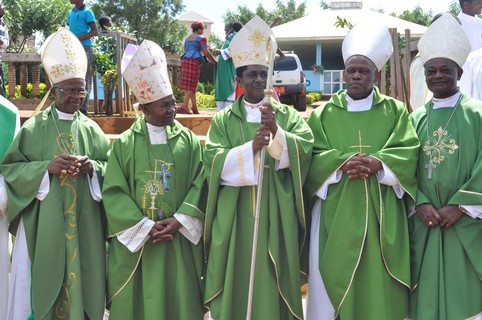English-speaking and French-speaking bishops in Cameroon are being divided by the year-long ‘Anglophone crisis’ which has been threatening the country. On October 1, secessionist leaders in the English-speaking part of the country made a nominal declaration of independence. Government forces clashed with independence-minded demonstrators, leaving at least 17 people dead (although opposition leaders claimed at least 100 died).
Anglophone bishops have described the killings as “a growing genocide.” In a long and detailed statement published on Oct. 4, the bishops decried a “warlike atmosphere” of killings, looting and arson carried out by “young people” and acts of “brutality, torture, the inhuman and unjustified treatment meted out” by the “forces of law and order.”
But the characterization of the crisis as a genocide wasn’t shared by the bishops from the other regions of the country. Archbishop Samuel Kleda of Douala, Cameroon’s largest city, is the president of the nation’s episcopal conference.
The Francophone archbishop issued a statement condemning the violence, but refused to use the inflammatory language used by his Anglophone colleagues. “In the name of our common citizenship, brotherhood and humanity, the defense of legitimate interests must go hand in hand with social harmony, which is what is being sought…Violence, regardless of its source does not build, it destroys,” Kleda said.
The archbishop pointed out that all regions of Cameroon face problems, which he said can be resolved through dialogue. Kleda said that decentralization would resolve many regional problems in Cameroon, including the Anglophone problem. However, his statement drew criticism from clergy in the English-speaking zones, who objected to the Anglophone crisis being conflated with other problems in the country.But that drew sharp criticism from Anglophone Cameroonians who have always seen the Anglophone Problem as one that is unique and must never be lumped together with all other problems in Cameroon.
Church leaders in Anglophone Cameroon have also criticized Kleda for not condemning the arrests and detention of Anglophone leaders and the government’s violent methods in confronting demonstrators.Cardinal Christian Wiyghan Tumi – the retired Archbishop of Douala and the man who ordained Kleda to the priesthood, has accused the Francophone bishops of Cameroon of not standing in solidarity with their Anglophone counterparts. Tumi noted no French-speaking bishop spoke up when three English-speaking bishops were brought to court for their actions in support of a school boycott last year.
In a letter to the archbishop, Father Gerald Jumbam says Anglophone Cameroonians, by virtue of their history, “cannot be loyal subjects to the despicable and tyrannous Yaoundé government. Archbishop, you speak of Decentralization and you offer us it as the best gift you think fitting for the resolution of this crisis? We are determined to decline a gift so laden with spurious promises and deceitful propensities.”Cameroon’s bilingual and bi-cultural status derived from its colonial heritage. Initially administered as a German Protectorate in 1884, Cameroon would later be shared with France and Britain as League of Nations Mandates after Germany was defeated in the First World War.
The end of the Second World War and the establishment of the United Nations saw the two parts of Cameroon transition from mandated territories to UN Trust Territories. In 1960, the northern part of Cameroon administered by France gained its independence. The southern part administered by Britain as part of Nigeria was in 1961 subject to a plebiscite in which they were offered independence by reuniting with their francophone Cameroonian “brothers” or by remaining part of Nigeria. The results showed an overwhelming desire by English-speaking Cameroonians to reunite with the French-speaking part of Cameroon.
The “marriage” was guaranteed by a Federal Constitution that was meant to preserve and protect the minority Anglophones and their colonial heritage. But in 1972 then-President Ahmadou Ahidjo organized a referendum that dissolved the federation in favor of a united republic, thereby removing the protections Anglophones enjoyed.
Currently, Anglophones make up around 20 percent of the population. Jumbam said Kleda was ignoring the fact the terms of the union between English and French-speaking Cameroons had been jettisoned to the disadvantage of Anglophones.
Church leaders in Anglophone Cameroon have also criticized Kleda for not condemning the arrests and detention of Anglophone leaders and the government’s violent methods in confronting demonstrators.Cardinal Christian Wiyghan Tumi – the retired Archbishop of Douala and the man who ordained Kleda to the priesthood, has accused the Francophone bishops of Cameroon of not standing in solidarity with their Anglophone counterparts. Tumi noted no French-speaking bishop spoke up when three English-speaking bishops were brought to court for their actions in support of a school boycott last year.
At the time, disgruntled lawyers and teachers were protesting the use of French in courts using the Anglo-Saxon common law tradition (practiced in the English parts of the country) and in Anglophone schools. Bishop Cornelius Fontem Esua, Bishop Michael Ndi, and Bishop George Nkou were brought to court for failing to teach children in their schools during the boycott.“No French-speaking Bishop was there. Not even the Secretary-General of the National Episcopal Conference was sent to go and see,” Tumi said.
“In fact, I would say that the others should keep quiet when the bishops of the [Anglophone bishops’ conference] write because they know better what is happening,” the cardinal said.
On Saturday, Cameroon’s Defense Minister Joseph Beti Assomof said the military “will eradicate this inconvenient situation.” State radio announced Cameroon’s President Paul Biya “has declared war on these terrorists who seek secession,” and would restore “peace and security” to the region.
Source: Crux





